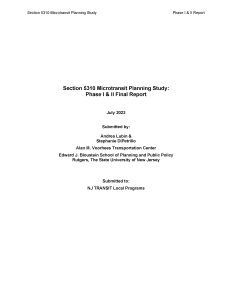Principal Investigators: Andrea Lubin, Stephanie DiPetrillo
Transportation’s vital role in achieving successful community integration for persons with disability and older adults is well documented. In New Jersey, many persons with disability and older adults utilize and depend on one of the 21 county community transit providers to help meet some or all of their mobility needs. However, primarily due to funding constraints, service hours are limited among county community transit providers, with few offering evening and/or weekend service. Further, a study undertaken by this Rutgers research team in 2010-12 documented that most NJ county transportation services do not exceed five miles beyond their county’s geographic border. Avenues to pursue seamless trips have become more readily available in recent years, due primarily to advances in technology and new service models including microtransit. Microtransit is small scale, on‐demand, dynamic-route, shared transit services such as shared ride taxis and other non-fixed route operations. This planning study is focused on exploring opportunities for utilizing microtransit as a cost-effective means to meet demand for more seamless, inter-county trips among New Jersey’s county community transit customers. The team will identify New Jersey community transit providers as well as viable potential service partners interested in developing and piloting a microtransit, seamless border service and will develop and present recommendations to facilitate a pilot implementation.

